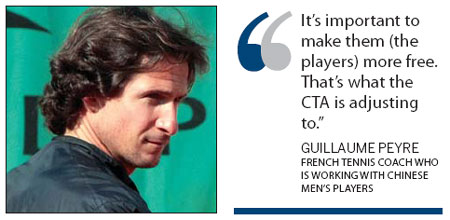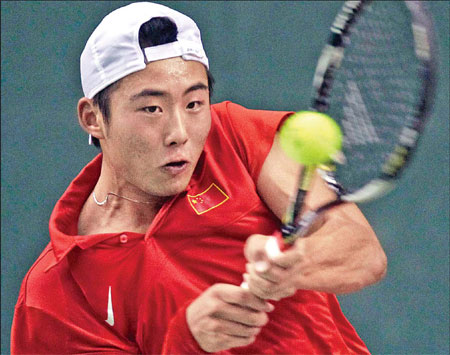Helping hands from the west
Updated: 2011-10-30 07:51
By Sun Xiaochen(China Daily)
|
|||||||
|
China's Zhang Ze hits a backhand during his Davis Cup world group playoff singles match against Australia's Lleyton Hewitt in Beijing on July 10. Zhang is now under the guidance of French coach Guillaume Peyre. Jason Lee / Reuters |

China tennis making moves forward thanks to overseas coaches, writes Sun Xiaochen.
China's younger generation of tennis players claim they are inspired by French Open champion Li Na and Grand Slam doubles winner Zheng Jie.
However, they have one thing neither Li or Zheng had in their formative tennis years - help from the west.
"Actually, I envy them (the younger generation) a lot. Now, they have foreign coaches around that we didn't have when we were young. It's a good chance for them to learn the game professionally," Zheng said during the Mercedes-Benz China Tennis Grand Prix held in Nanjing this week.
With a growing clamor for reform of the traditional state-run system, the Chinese Tennis Association (CTA) has drafted foreign experts to groom its rising stars.
Although still steering youngsters away from the self-managed "flying solo" way, the CTA has started to tentatively fix its old-fashioned, local-based coaching methods.
Frenchman Guillaume Peyre, Cyprian Marcos Baghdatis' former coach, was imported in September to foster two of China's elite male players, Zhang Ze and Gong Maoxin.
Peyre, who worked with Baghdatis during his heyday - including an Australian Open final berth in 2006 at 20, is renowned for cultivating young talent. He was even described as a "guardian angel with a trusting and confident gaze" in the Cyprian's autobiography.
Zhang and Gong have also felt that after only two months.
"His tireless encouragement throughout training and matches has impressed me a lot. The effort worked mentally first, making us much more confident," said world No 397 player Gong.
"He also taught us what a pro should be and how the pro way runs. Like I shouldn't take a shower right after matches, but go through a post-match routine with therapy, massage and game summarizing first," said Zhang, who won his first ATP main draw match under Peyre's guidance at the China Open earlier this month.
Zeng Shaoxuan, the men's national team head coach, said Peyre's experience on the ATP Tour was a boon not only for players, but also domestic coaches, whose outdated philosophy may hamper the fundamentals of young guns.
Peyre shrugged off the gap between Chinese players and the world's elite, stressing that the playing schedule were more important to improving performances and rankings.
"Zhang's level is definitely higher than his ranking. He needs to travel freely to play more tournaments on a pro schedule. It's important to make them (the players) more free. That's what the CTA is adjusting to," Peyre said.
Carlos Rodriguez, retired Belgian star Justine Henin's mentor for 15 years, echoed the Frenchman's sentiments.
"The talent and the facilities here are amazing. They need to be well organized. They just need to follow every detail in a professional way. That's why we are here," said the Argentine who worked with Henin from 1996, helping her to clinch seven Grand Slam titles.
Launching the China branch of Henin's 6th Sense Tennis Academy in Beijing last February, Rodriguez has shifted his focus from the elite to the lower levels.
Recently, the academy signed a contract to cultivate the top three junior players from northeast China's Liaoning province and prepare them for possible Grand Slam events through 2013.
Apart from tennis, foreign know-how has appeared in other sports in China as overseas coaches such as Aussie swimming mentor Dennis Cotterell and former Spanish national soccer team manager Jose Antonio Camacho now shout from the sidelines of the swimming pool and soccer pitch.
Still, tennis has a long way to go, despite help from friends abroad.
That depends on how well a foreign coach fits into a totally different environment, said Timothy Nichols, traveling trainer of China's budding WTA star Peng Shuai.
"It's always hard for a foreigner to get used to the unfamiliar environment so fast. It's important to set up good relationships and merge with the system here. If you can't, you are not going to make any difference. It takes time," said Nichols, who worked with the Japanese Tennis Association from 1990 to 2000.
Nichols says emphasis on foreign programs is not always worthwhile, claiming, "Japan has sent dozens of kids to train in America at huge expense while reaping only one (champion), Kei Nishikori, at the Shanghai Masters".
Meanwhile, culture shock and language barriers remain between foreign coaches and local talents.
"Sometimes, I will reconsider his instructions. Some of his ideas may be advanced, but not fit me very well. I'll keep my head thinking and try to figure out what really helps, not take all from him," said 17-year-old female player Zheng Saisai, who trains with Nichols.
(China Daily 10/30/2011 page8)
